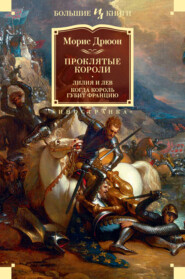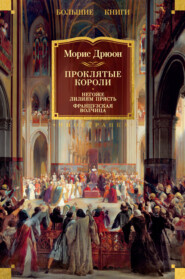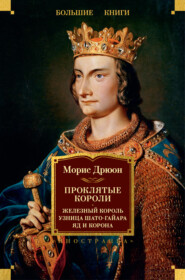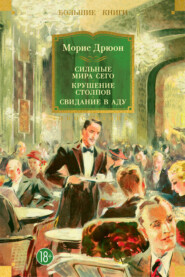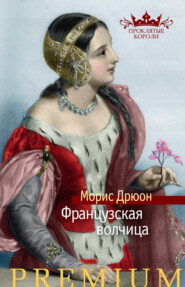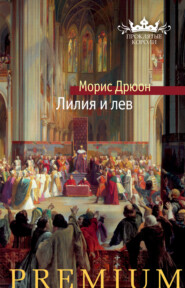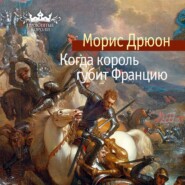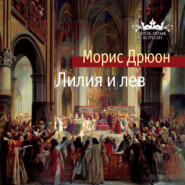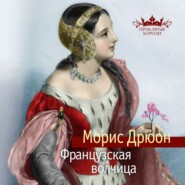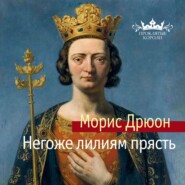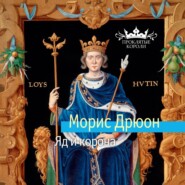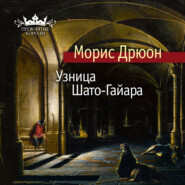По всем вопросам обращайтесь на: info@litportal.ru
(©) 2003-2025.
✖
The Accursed Kings Series Books 1-3: The Iron King, The Strangled Queen, The Poisoned Crown
Автор
Год написания книги
2018
Настройки чтения
Размер шрифта
Высота строк
Поля
She rose and, accompanied by Guccio, went to a window embrasure where she read the message at her ease.
‘Are you going back to France?’ she said in a low voice.
‘As soon as it pleases you to order me to do so, Madam,’ replied Guccio softly.
‘Then tell Monseigneur of Artois that I shall shortly be in France, and that everything will be done as we agreed.’
Her face showed some animation, but her attention was entirely centred upon the message and not upon the messenger. Nevertheless, a royal desire to recompense those who served her made her add, ‘I will tell Monseigneur of Artois that he must reward your trouble better than I know how to do at this moment.’
‘The honour of seeing and obeying you, Madam, is the finest reward that I could wish.’
Isabella thanked him with a movement of her head, merely as she would have greeted the simple compliment of a servant, and Guccio realised that between the great-granddaughter of Monsieur Saint Louis and the nephew of a Tuscan banker there was a distance that could never be crossed.
In a loud voice, so that the Despenser might hear, Isabella said, ‘I will let you know through Albizzi what I may decide about these pearls. Good-bye, Messire.’
She dismissed him with a gesture.
He went down on one knee again and then retired, relieved at having accomplished his mission, but very disappointed of his dreams.
4 (#ulink_9446c0c1-b53a-5ed2-a86b-bb71f926f028)
The Debt (#ulink_9446c0c1-b53a-5ed2-a86b-bb71f926f028)
DESPITE ALBIZZI’S COURTESY in offering to keep him several days, Guccio left London next morning at dawn, extremely annoyed with himself. He could not forgive himself, that he, a free citizen of Sienna, who on that score alone considered himself the equal of any gentleman on earth, should have allowed himself to be disconcerted by the presence of a queen. Do what he would, he could never forget that he had been tongue-tied, that his heart had beat too quickly, and that his legs had felt weak, when he found himself in the presence of the Queen of England. And she had not even honoured him with a smile. ‘After all, she is but a woman like another! What had I to be nervous about?’ he kept on repeating to himself with annoyance. Even when he was already far from Westminster he was still muttering to himself in this strain.
Having found no companion, as on his previous journey, he was travelling alone, chewing over his discontent both of others and himself. This state of mind continued during the whole of his journey home, becoming even worse as the miles passed.
Since he had not received the reception he had expected at the English Court nor, on his appearance alone, been given the honours due to a prince, he came to the conclusion, as he stepped on to the soil of France once more, that the English were barbarians. As for Queen Isabella, however unhappy she might be, however contemptibly she might be treated by her husband, it was no more than she deserved. ‘Was one to cross the sea at the risk of one’s life, only to be given the thanks due to a servant? Those people had a great air, but their manners were not from the heart. They rebuffed the most loyal devotion. They need feel no astonishment if they were so little liked and so often betrayed.’
Upon these very same roads a week ago, he had thought of himself as an ambassador and a royal lover. Now Guccio began to understand that fortune does not smile upon young men as it does in fairy tales. But he would have his revenge. How, or upon whom, he did not yet know, but revenge was what he intended to have.
In the first place, since destiny and the contempt of kings had destined him to be but a Lombard banker, he would be such a banker as had never before been seen. His uncle Tolomei had charged him to return by the branch at Neauphle-le-Vieux to recover a debt. Very well, the debtors would soon discover the sort of lightning that had struck them!
Journeying by Pontoise, in order to turn off across the Île de France, Guccio, who always had to be playing a part to himself, had become the implacable creditor. Beside him the Jew of Venice, who in the legend demanded a pound of flesh for a pound of gold, would have seemed positively tender-hearted.
Thus he arrived at Neauphle on the morning of the feast of Saint Hugh. The branch of the Tolomei bank occupied a building near the church, on the town square built on the side of a hill.
Guccio hustled the employees of the bank, demanded to see the account-books and rated everyone. What on earth was the chief clerk thinking about? Had he, Guccio Baglioni, the nephew of the head of the company, to go out of his way each time a sum of three hundred pounds was due? Primo, who were these squires of Cressay who owed three hundred pounds? He was informed. The father was dead, which Guccio already knew. What more? There were two sons, aged twenty and twenty-two. What did they do? They spent their time hunting. Evidently idlers. There was also a daughter aged sixteen. Certainly ugly, Guccio decided. And what of the mother who ran the house since the Squire of Cressay’s death? They were people of good family, but utterly ruined. How much was their house and land worth? Fifteen hundred pounds more or less. They had a mill and a hundred serfs on their property.
‘And owning all that, do you mean to say you haven’t been able to make them pay up?’ Guccio cried. ‘You’ll see that they’ll soon do so for me.’ Where did the Provost live? At Montfort-l’Amaury? Very well. What was his name? Portefruit? Good. If they hadn’t paid up by tonight, he would go and see the Provost and have their property seized. That was all there was to it!
He mounted his horse again and left for Cressay as if he were going to take a fortress single-handed. ‘My gold or distraint, my gold or distraint,’ he kept repeating to himself. ‘And they can pray to God and his Saints.’
The trouble was that someone had had the same idea before him, and that someone was Provost Portefruit.
Cressay, which is a mile and a half from Neauphle, is a village built on the side of a valley by the bank of the Mauldre, a stream which is not too wide for a horse to jump.
The castle Guccio came in sight of was in fact no more than a large manor house in somewhat poor repair. It had no moat, since the river served it for defence together with low towers and a marshy approach. The whole place was redolent of poverty and decay. The roofs were collapsing in several places; the pigeon-loft appeared ill-stocked; there were cracks in the mossy walls, while wide gaps in the neighbouring woods revealed hundreds of stumps sawn off close to the ground. There was a considerable bustling in the courtyard as the Siennese entered it. Three royal sergeants-at-arms, their be-lilied staves in their hands, were harrying some ragged-looking serfs to gather the livestock, fasten the oxen in pairs and bring sacks of grain from the mill to load on to the Provost’s wagon. The shouting of the sergeants, the running to and fro of terrified peasants, the bleating of some twenty sheep and the screeching of chickens together produced an astonishing hubbub.
No one paid any attention to Guccio; no one came to take his horse, so he tied the bridle to a ring. An old peasant passing by merely said, ‘Bad luck has fallen upon this house. If the master were alive, he’d die a second death. It’s unjust!’
The door of the building was open and from it came the sound of a violent argument.
‘It would seem that I have not come on a very propitious day,’ thought Guccio, whose bad temper was increasing all the time.
He mounted the steps to the threshold and, guided by the sound of the voices, entered a long, dark chamber, with stone walls and a beamed roof.
A young girl, whom he scarcely bothered to look at, came to meet him.
‘I have come on business and wish to speak to someone belonging to the family,’ he said.
‘I am Marie de Cressay. My brothers are here and so is my mother,’ replied the girl in a hesitant voice, pointing to the far end of the room. ‘But they are very busy at the moment.’
‘No matter, I’ll wait,’ said Guccio.
And to show that he intended doing so, he went over to the fireplace and extended his boot to the flames, though he did not feel cold.
At the far end of the room, the argument was still going on. With her two sons, one bearded, the other beardless, but both tall and ruddy, Madame de Cressay was stubbornly holding her own with a fourth personage whom Guccio soon realised was Provost Portefruit.
Madame de Cressay – known as Dame Eliabel in all the surrounding district – had a bright eye, a fine bust, and bore her forty years buxomly in her widow’s weeds.
‘Messire Provost,’ she cried, ‘my husband got into debt in order to equip himself for the King’s war in which he gained more wounds than profit, while the domain, without a man to look after it, got on as best it could. We have always paid our tithes, our State benevolences and given charity to God. Who has done more in the Province, may I ask? And is it to enrich people of your sort, Messire Portefruit, whose grandfather went barefoot in the gutters hereabouts, that we are to be robbed?’
Guccio looked about him. A number of rustic stools, two chairs with backs to them, benches fastened to the wall, some chests and a great pallet bed with curtains which, nevertheless, revealed the palliasse, made up the furniture of the room. Above the hearth hung an old shield with faded colours. The war-shield, doubtless, of the late Squire of Cressay.
‘I shall complain to the Count of Dreux,’ went on Dame Eliabel.
‘The Count of Dreux is not the King, and I am acting upon the King’s orders,’ replied the Provost.
‘I don’t believe you, Messire Provost. I will not believe that the King orders people who have formed part of chivalry for two hundred years to be treated like malefactors. Indeed, if that were the case, the kingdom would cease to function.’
‘At least give us time!’ said the bearded son. ‘We will pay by instalments. You cannot strangle people like this.’
‘Let us put an end to this argument. I have already given you time,’ interrupted the Provost, ‘and you have paid nothing.’
He had short arms, a round face and spoke in a sharp voice.
‘My job is not to listen to your complaints, but to collect debts,’ he went on. ‘You still owe the Treasury three hundred and twenty pounds and eight pence: if you haven’t got them, that’s too bad. I shall seize your belongings and sell them.’
Guccio thought, ‘That fellow is using exactly the tone I intended to use myself and, by the time he’s finished, there’ll be nothing left to seize. This is a peculiarly useless journey. I wonder if I should join them straight away?’
He felt angry with the Provost who had appeared so inopportunely and was taking the wind out of his sails, stealing the very part he had intended to play himself.
The girl who had received him remained standing not far away. He looked at her more closely. She was fair and had beautiful waves of hair showing beneath her coif, a luminous complexion, great dark eyes and a slender, straight and well-turned figure. She seemed very embarrassed that a stranger should be present at the scene. It was no everyday occurrence to see a young cavalier of agreeable appearance, whose clothes testified to a certain wealth, pass through those parts; it was most unfortunate that this should occur upon the family’s most disastrous day.
Guccio’s eyes remained fixed on Marie de Cressay. However ill-disposed he felt, he realised that he had thought badly of her without knowing her. He had not expected to find so attractive a girl in such a place. Guccio’s eyes slid from her breast to her hands; they were white, well-formed and slender, altogether in keeping with her face.
At the far end of the room the argument was still going on.






